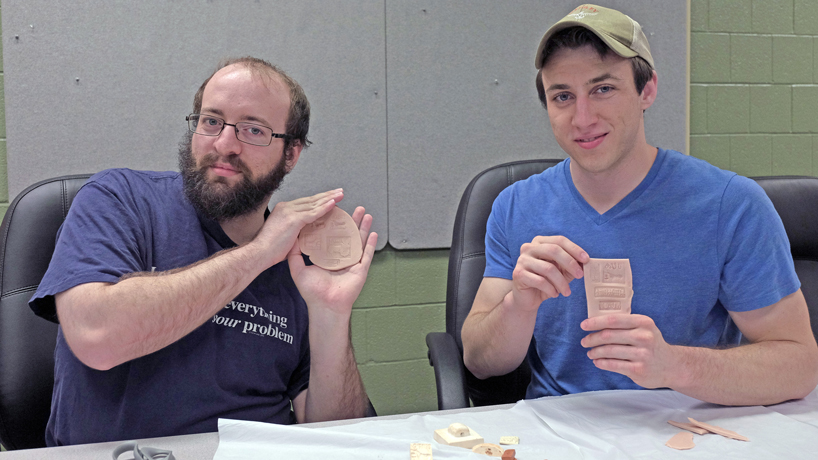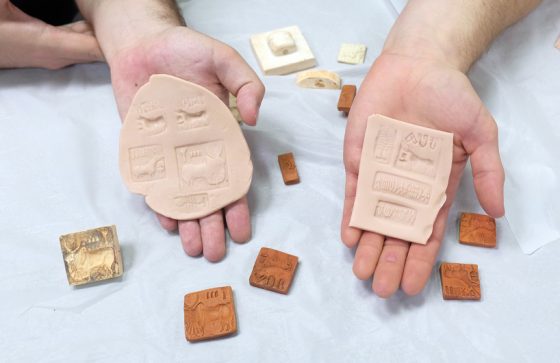
Anthropology senior Theodore Hopkins and liberal studies junior Cameron Jensen handcraft their own language tablets during a session of the Writing Systems of the World course. (Photos by August Jennewein)
Toponymist, Air Force veteran and Taekwondo practitioner Theodore Hopkins believes language is one of the major lenses through which everyone sees the world.
“You know this is true by studying the key words of a culture,” said Hopkins, a senior majoring in anthropology at the University of Missouri–St. Louis. “It’s telling that the Nepalese have so many ways to talk about rocks just like in Inuit language there are so many ways to talk about snow.”
Hopkins found his passion for language during a Latin course he took at Winter Springs High School in Florida. With motivation from his teacher, he found that he was able to use context and figure out the meaning of new words very quickly.
Upon graduating from high school, Hopkins joined the Air Force, and after scoring very highly on the Defense Language Aptitude Battery, he became a linguist specializing in Korean intelligence. His natural interest with language and culture prompted him to sign up for Anthropology 3214: Writing Systems of the World.
Here, he has felt right at home deciphering how morphemes and phonemes weave their way through various languages including Tibetan, Cyrillic and Hebrew.
“I spent over four years as a military linguist, and the course still has a lot to offer for me,” Hopkins said. “I’ve learned more about the roots of languages than I ever had before. I hadn’t known that Korean was derived from Mongolian and mixed with a lot of Chinese graphs and the Mongolian alphabet, basically. It’s been neat tracing the transition of Mongolian to Korean.”

Ei’ichi Shibusawa-Seigo Arai Endowed Professor of Japanese Studies and Professor of Anthropology Laura Miller hopes in-calls projects can provide concrete understanding of core principles in writing systems.
Laura Miller, who serves as both Ei’ichi Shibusawa-Seigo Arai Endowed Professor of Japanese Studies and an anthropology professor, believes that the study of writing systems expands both critical thinking skills and world views.
“From an anthropological perspective, this course serves as one way for students to see relationships between such things as writing and identity,” Miller said. “For example, there are some languages that are identical yet use different writing systems to indicate different cultural identities, such as Serbian and Croatian, or Hindi and Urdu. The study of decipherment and other writing systems also reveals to us that all writing systems operate systematically in knowable ways, so students become less intimidated when they see scripts they don’t know. Once you figure it out, it can be a lot of fun.”
Spurred on by Miller’s encouragement, Japanophile and liberal studies junior Cameron Jensen approaches homework and class exercises with more pleasure than dread. Instead of focusing on dry lectures, Miller creates an atmosphere of collaboration and hands-on work in the classroom as they decode cryptograms that might look right at home in a Sunday paper brainteaser section.
“My study group gets jealous of my homework,” Jensen admits.
During one class period, Miller and her students approached understanding the logosyllabic Luvian language with a welcome amount of humor. Jokingly, they remarked that some hieroglyphs of the language looked like cartoon feet, bugs or even Russian nesting dolls.

Deciphering puzzles like this one based on the Luvian language is a regular exercise for students in the course. (Graphic courtesy of Laura Miller)
Levity aside, Miller hopes students like Hopkins and Jensen can take lessons from the course and apply them to further understanding the foundations of language and culture.
“The most rewarding thing for me is that at the end of the course, students no longer see unknown writing systems or unknown languages as gibberish. They realize that even if they don’t speak or read the language, they are able to classify it and understand how it works by using the skills we learn in class. I love being able to help students discover that all languages and all writing systems are logical and structured.”
Hopkins, who plans on finding work as a foreign service officer after graduation, will continue to cultivate his fascination with language.
“Looking up a word in the dictionary doesn’t always help you understand how it communicates very distinct feelings,” he said. “You have to use them and see how they work and fit into the culture that created them.”















